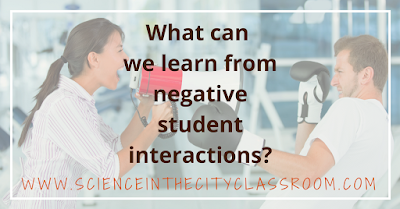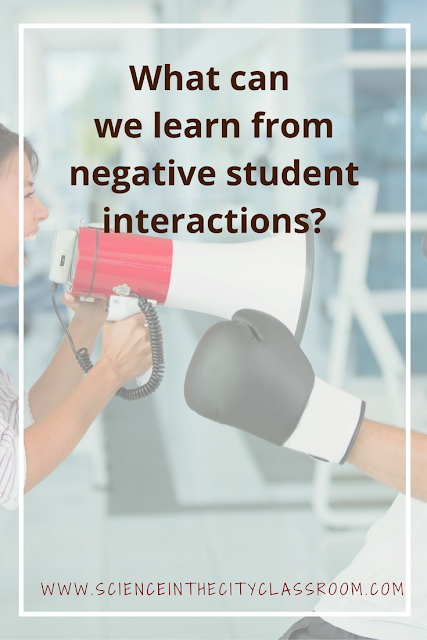What can be learned from negative student interactions
Sometimes the students will tell us why they are acting that way, sometimes they don’t. Sometimes we find out later, or we may not. You may only see the behavior, and not know the reasoning behind it.
I have had students who are usually good kids, but are acting out on a particular day. Some of the reasons that I have heard include the following: I was up most of the night because there was a shooting at my house, and the police were there. Students who miss a lot of class may not be because they don’t want to attend. I have a student who misses a lot of school. I have been on her case to attend more regularly. I have tried to call home, but have never been able to speak to anyone. Then I find out that she doesn’t come to school because she is often taking of her brother’s baby, because the baby’s mother is out of the picture, and brother works to support the baby. I have worked with students whose parents are in and out of medical care, and who don’t know where they are sleeping every night.
The stress in some students’ lives is beyond our comprehension, sometimes. Particularly when we figure in the fact that they may not have the role models and support at home to figure out different options.
Choices we have
All of these things are difficult, and largely out of our hands. However, as a teacher, we have a lot of choices regarding how we react to the situation. You can give sympathy, but be careful not to get drawn into either a soap opera, or to lowering standards and excusing behavior, or academics. It is important for students to know that you still uphold those standards, but are willing to work with them. This means being flexible. You could give an extension. Maybe you allow the student to come in after school and work on an assignment. Maybe you could give an alternative option to complete the assignment.
You could allow the student to have his or her head down for one day, as long as it doesn’t become a habit. Give them a pass to the nurse or counselor if they ask for that.
It is important to show concern, and show that you care, but not to lower your standards. Treat them the way you would want to be treated. Give the student the benefit of the doubt that they are telling the truth, and needs what they are asking you for. Then work with them to develop a plan where they can still be successful and complete their work. Maybe negotiate, if you get some work done, you can go to the counselor during the last 10 minutes. It’s scaffolding really, just not scaffolding of academics. Scaffolding of coping skills and problem solving skills that many of our students don’t have.
Your other options as the teacher are to go to either extreme. Hear their story and excuse them. (This isn’t the most common option). The other option that I have seen is to really draw a hard line. It might sound like this “No, if you are in class you need to be doing work! This is not a place to have your head down!” “Go see your counselor another time, you need to stay in class.” Or worse yet, to take the head down, or refusal to work personally. That might sound like this “Don’t disrespect me! I told you to sit up. In my classroom you have to follow directions.” This really risks alienating students if they feel that you don’t care about them as people. There are bodies of research showing that students need to feel cared about in order to learn successfully. That is discussed more thoroughly here.
You could allow the student to have his or her head down for one day, as long as it doesn’t become a habit. Give them a pass to the nurse or counselor if they ask for that.
It is important to show concern, and show that you care, but not to lower your standards. Treat them the way you would want to be treated. Give the student the benefit of the doubt that they are telling the truth, and needs what they are asking you for. Then work with them to develop a plan where they can still be successful and complete their work. Maybe negotiate, if you get some work done, you can go to the counselor during the last 10 minutes. It’s scaffolding really, just not scaffolding of academics. Scaffolding of coping skills and problem solving skills that many of our students don’t have.
Your other options as the teacher are to go to either extreme. Hear their story and excuse them. (This isn’t the most common option). The other option that I have seen is to really draw a hard line. It might sound like this “No, if you are in class you need to be doing work! This is not a place to have your head down!” “Go see your counselor another time, you need to stay in class.” Or worse yet, to take the head down, or refusal to work personally. That might sound like this “Don’t disrespect me! I told you to sit up. In my classroom you have to follow directions.” This really risks alienating students if they feel that you don’t care about them as people. There are bodies of research showing that students need to feel cared about in order to learn successfully. That is discussed more thoroughly here.
What are the Costs and Benefits?
What are the benefits of taking a more compassionate route? First of all, you can always say ‘no’ the next time, or ramp up the consequences, but it hard to repair your relationship with the students. If it becomes a pattern that you are really concerned about, you can address it differently. However, a student may actually work harder for you because they know that you care. One of my past administrators said to me that if a student is really fixated on leaving (going to the bathroom, nurse, counselor), they aren’t paying attention anyway, so you may as well write them a pass. You are building a relationship with a person, not only teaching academics. By working with them, you are showing them respect. They will (likely) show respect in return. Finally, as young adults, they are working to be more independent, and to problem solve and their own. It is our role to give them the opportunity to do so, give them a little wiggle room to learn, and then help teach them the skills to do so more successfully.
Our education system, as we probably know, is very ‘one size fits all.’ Our students, however, are not one size fits all. This is another step that you can use to instill some flexibility into your classroom, particularly when dealing with diverse students.
If you try any of these strategies, or something similar, leave me a comment below. I’d love to hear how it works out!
Our education system, as we probably know, is very ‘one size fits all.’ Our students, however, are not one size fits all. This is another step that you can use to instill some flexibility into your classroom, particularly when dealing with diverse students.
If you try any of these strategies, or something similar, leave me a comment below. I’d love to hear how it works out!












